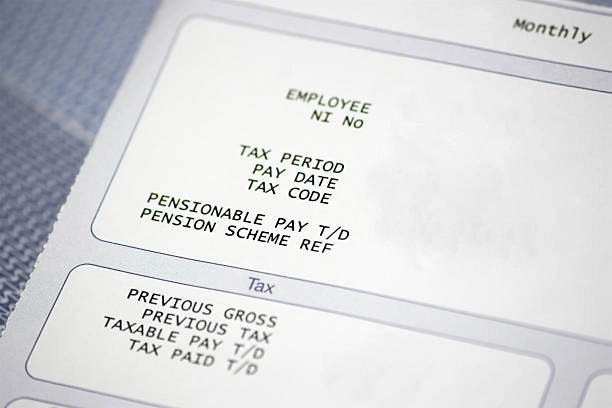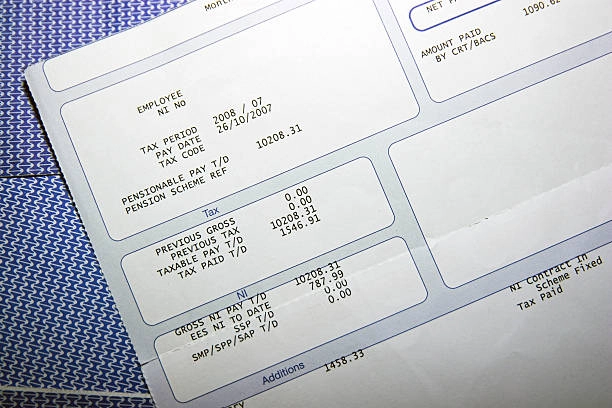How To Read Your Paycheck Stub Abbreviations Like a Pro
Do you ever feel like paycheck stub abbreviations are written in a foreign language? Well, you're not alone. Whether you’re receiving a paycheck or making one, there's a lot going on in those tiny letters on your paycheck stub, so it can often be hard to make sense of them all. In this blog post, we'll decode the most common paycheck stub abbreviations so you can easily and confidently interpret your next
Common Items Included on Your Paycheck Stub

Before we learn what the abbreviations mean, it's good to have a solid idea of what information your paycheck stub holds. Some companies may have detailed paycheck stubs, while others only include the most relevant information. Although, there are a few items that all employers are required by law to include on your paycheck. Here's a list of items that appear on all paycheck stubs that you need to be familiar with:
-
Gross Pay — Your gross income is the amount you earn before any taxes or deductions are taken out.
-
Net Pay — This is the amount you're paid after all applicable taxes and deductions are taken out from your gross pay.
-
Federal Tax Amount — The amount collected by the Internal Revenue Service (IRS) and the amount you pay the federal government for your income tax.
-
State Tax — State income tax is collected by your state government, though some states may not require their residents to pay state tax.
-
Local Tax — This is the tax collected by your local government that is required by some cities, counties, or school districts.
-
Social Security — Medical expenses are partially covered by the Medicare taxes deducted from your paycheck.
-
Medicare — This amount of money goes toward Medicare taxes, which are used to help fund health benefits for those who need financial assistance.
-
Year-to-Date — This information shows the sum of your paychecks and other deductions so far in the current calendar year. This helps you see how much money you've earned throughout the year versus just seeing what's in your paycheck once a month.
Header Abbreviations
The paycheck stub header is where you'll find your name and address, pay period, the address of your company or employer, and your Social Security number. Here is a list of the abbreviations you'll usually find in the header of your paycheck stubs:
-
Check No. — Check number
-
SSN — Social Security number
Paycheck Stub Abbreviations for Earnings

Now that you know what's included in the paycheck stub header, it's time to move on to your earnings. This is likely the part of your paycheck you're most concerned about, as it details the amount of money you are receiving. Here is a list of paycheck stub abbreviations that relate to your earnings:
-
Add Pay — Additional pay
-
BRVMT — Bereavement pay
-
Cmp Pyot — Compensatory time payout
-
CNT Pay — Contract pay (or your salary)
-
Hol — Holiday pay
-
Jury — Jury duty pay
-
Misc — Miscellaneous pay
-
Move Rem — Move reimbursement
-
OnCall — On-call pay
-
PTO — Personal/paid time off
-
Sick — Sick pay
-
SignOn — Sign-on bonus pay
-
Severanc — Severance pay
-
TuiReimb — Tuition reimbursement
-
Vac — Vacation pay
-
YTD — Year-to-date earnings
You get your pay stub, and it does not match what you expected. What do all these paycheck stub abbreviations mean? To avoid confusion, decipher what each abbreviation and acronym stands for. Not only will you learn what an "SSN" is, but you will also be able to understand the earnings and deduction abbreviations on your pay stub.
Paycheck Stub Abbreviations Decoded
Your paycheck will contain various abbreviations. This is simply a method of saving time and space on your pay stub. However, when you try to interpret it all, it may be quite frightening. You'll find several popular paycheck stub abbreviations as well as those that aren't so prevalent on your pay stub. To make things easier, divide them by the pay stub abbreviations included in the header, earnings, and deductions sections.
Paycheck Stub Abbreviations for Deductions

Pay taxes are deductions from your earnings that are withheld during each pay period. Deducted amounts can include taxes, insurance premiums, benefits costs, and contributions to a retirement plan or health savings account. It's worth noting that retirement savings are often facilitated through pre-tax deductions such as a 401k plan. Here are the most common paycheck stub abbreviations that deal with tax deductions:
-
FICA — Med — Pre-tax dollars are used to contribute to Medicare under the Federal Insurance Contributions Act.
-
FICA — SS — This refers to the Federal Insurance Contributions Act — Social Security that you contribute mandatory Social Security payments to.
-
Fed/FWT/FIT/FITW — Federal tax withholdings ensure proper collection of federal taxes from your paycheck.
-
St Tax/SWT/SIT/SITW — State tax withholding
-
Local Tax — Local/city tax withholdings
Pre-tax deductions may also appear on your paycheck, affecting your taxable income before federal and state taxes are applied to your check stub as well. Below are the most common paycheck stub abbreviations that deal with before-tax deductions:
-
401k/Ret — 401k or retirement withholdings
-
DCR — Dependent care reimbursement
-
Den/Dental — Dental premium
-
INS/MED — Insurance or medical insurance
-
FSA — Flexible spending account
-
HCR — Health care reimbursement
-
HSA — Health savings account
-
LTD — Long-term disability withholding
-
STD — Short-term disability withholding
-
VIS/Vision — Vision premium
Lastly, some deductions that appear on your paycheck stub may come out after taxes. These are referred to as after-tax deductions. These are the most common paycheck stub abbreviations related to after-tax deductions:
-
Bankrpty — Bankruptcy
-
CHD SU — Child support
-
Garn — Garnishment flat rate
-
Garn % — Garnishment percentage
-
StdnLoan — Student loan
-
TX Levy — Tax levy
-
IRS Levy — Internal Revenue Service levy
Pay Stub Deductions Explained
Federal income taxes, state taxes, and Social Security are common deductions on an employee's paycheck. These federal and state withholdings account for a significant portion of the difference between your gross and net income. Other deductions may apply based on the programs you enroll in with your company.
How Much Tax Is Withheld From a Paycheck?
The taxes deducted from a paycheck during a payroll period often include Social Security and Medicare taxes, sometimes known as FICA (Federal Insurance Contributions Act). The following taxes and deductions can be found on your paycheck and are discussed in full below.
Why Is It Necessary to Understand Wage Deductions?
Each pay stub includes year-to-date fields for each withholding category, allowing you to keep track of how much you've paid in taxes, Social Security, and Medicare over the course of the year. Many employers include a comparable list for contributions to retirement schemes and health insurance policies. On your pay stubs, these fields are usually denoted by the term "YTD" (year-to-date). Federal law mandates accurate reporting and documentation of all payroll deductions. The last thing you want is for an error to be repeated over and over. If you have any issues with the information on your pay stub, please contact your payroll provider.
What Is a Paycheck's Gross Earnings?
A pay stub also shows gross and net earnings to date. This means you'll always know how much money you're taking home. This enables you to plan your monthly and annual budgets with accuracy and confidence. Check that the information on your most recent pay stub matches the information on your W-2 form, which lists your wages and taxes paid for the year.
How Long Should I Keep My Pay Stubs?
It's important to store your pay stubs securely for the entire year. Consider organizing them in a designated folder, which can be either digital or physical. After receiving your final pay stub for the year, which summarizes the year-to-date information for all 12 months, you can safely discard the earlier stubs. However, be mindful to destroy them securely (think shredding) to protect your sensitive information from identity theft.
For long-term storage, it's advisable to keep the final pay stub of each year, along with all other tax-related documents, for a period of six years following the submission of your tax return. This precaution ensures that you have all necessary documents on hand should you face an audit, although hopefully, that won't be necessary.
Conclusion
Being able to read your common pay stub with confidence and ease is a great skill to have. You'll be able to understand how your money is allocated to health savings accounts and retirement accounts and exactly why you're receiving the pay you're getting. In addition, arming yourself with abbreviations like social security taxes and flexible spending accounts is crucial in fluently deciphering your paycheck stub. And if you’re an accountant, being able to manage making invoices and paystubs that reflect more money from additional compensation or less money due to deductions quickly and efficiently is simply a great asset to have at your disposal!

